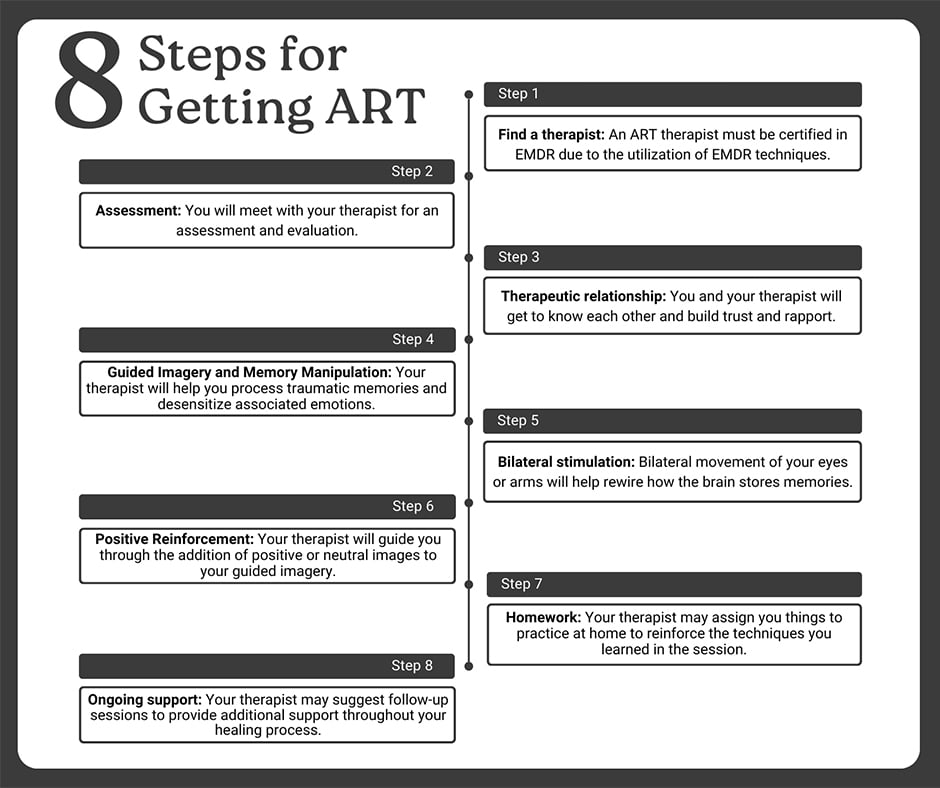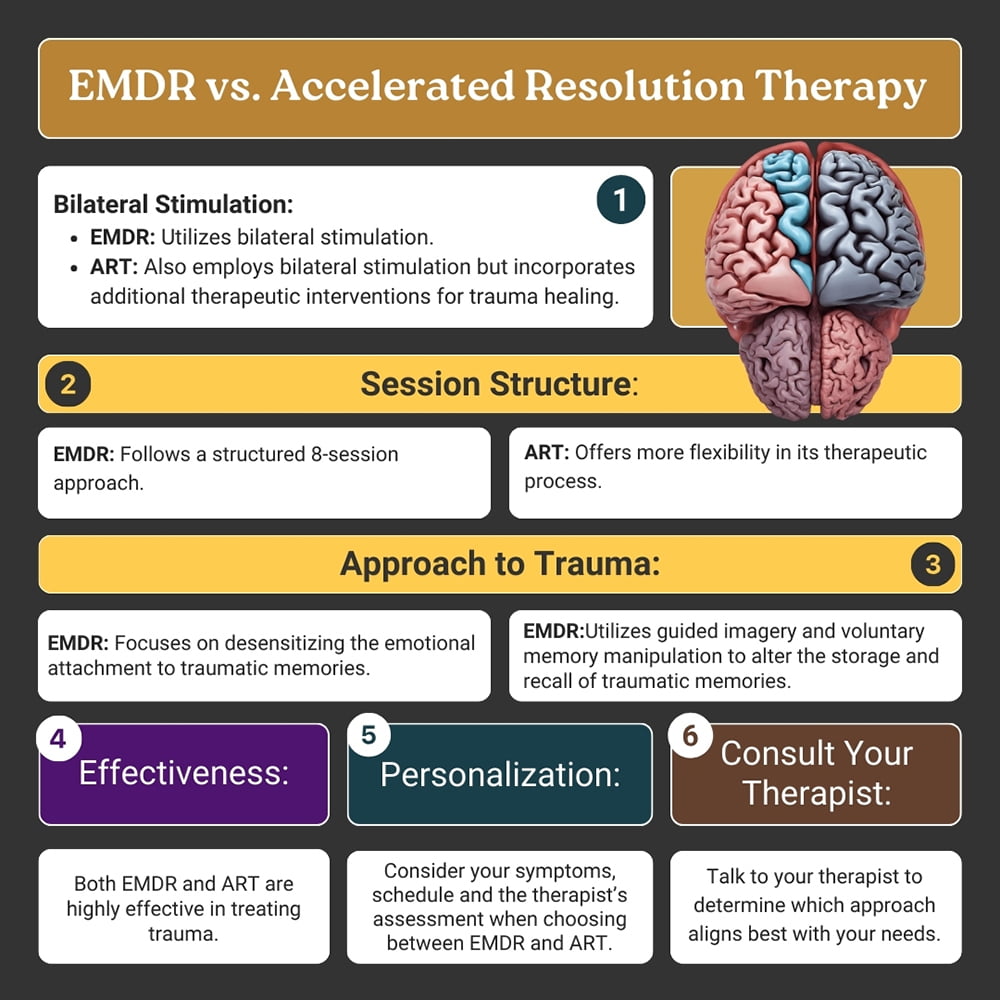What Is Accelerated Resolution Therapy?
Accelerated resolution therapy (ART) is a more recently developed type of psychotherapy that combines cognitive behavioral therapy (CBT), guided imagery, eye movement desensitization and reprocessing (EMDR) to help clients heal from trauma. During ART sessions, a qualified skilled therapist guides you to identify and process traumatic or stressful memories while using eye movement or bilateral stimulation. This helps to reorganize the traumatic memories in the brain and disconnect intense emotions from the memories.
What Is Accelerated Resolution Therapy Good For?
ART is effective for treating trauma, in addition to other conditions including:
- Anxiety
- Depression
- Grief and loss
- Substance use
Trauma Therapy Center therapists are highly skilled and trained in ART, in addition to other therapies to help their clients heal from trauma compassionately and confidentially.

Does Accelerated Resolution Therapy Work?
According to a research article published in Behavioral Research and Therapy, ART was highly effective in reducing symptoms of complicated grief. Participants in the ART group reported a 75% reduction in grief symptoms compared to the control group.
According to another study in the Journal of Psychological Trauma, ART was found to be effective in reducing symptoms of both PTSD and depression. Approximately 90% of participants experienced significant improvement in their symptoms.
Embrace Healing The Power of Trust in Therapeutic Relationships
“In my experience, the most effective aspect of therapy is the therapeutic relationship. Establishing trust between a client and clinician is the first step to healing.”
What Is the Difference Between EMDR and Accelerated Resolution Therapy?
Differences in EMDR and ART include:
- ART and EMDR both utilize bilateral stimulation, however, ART utilizes other therapeutic interventions to help heal trauma.
- EMDR uses a structured 8-session approach, while ART is more flexible.
- EMDR focuses on desensitization of the emotion attached to a traumatic memory, while ART uses guided imagery and voluntary memory manipulation to help individuals change the way they store and recall traumatic memories.
Both therapy techniques are highly effective in treating trauma. Talk to your therapist to find out which is right for you. Your choice of therapy intervention may depend on your symptoms, your schedule, personal preference, and the therapist’s assessment.

How to Do Accelerated Resolution Therapy?
The steps for getting ART include:
- Find a therapist: An ART therapist must be certified in EMDR due to the utilization of EMDR techniques. Our therapists at the Trauma Therapy Center have specialized training in EMDR and ART as well as extensive experience practicing these interventions.
- Assessment: You will meet with your therapist for an assessment and evaluation. You will discuss your symptoms and goals during this time. Your therapist will also provide you with information on the process and what to expect.
- Therapeutic relationship: You and your therapist will get to know each other and build trust and rapport.
- Guided Imagery and Memory Manipulation: Your therapist will guide you through processing traumatic memories and desensitizing the emotions associated with them.
- Bilateral stimulation: Bilateral movement of your eyes or arms will help rewire how the brain stores memories.
- Positive Reinforcement: Your therapist will guide you through the addition of positive or neutral images to your guided imagery.
- Homework: Your therapist may assign you things to practice at home to reinforce the techniques you learned in the session.
- Ongoing support: Your therapist may suggest follow-up sessions to provide additional support throughout your healing process.
ART is a powerful and effective treatment for trauma that can help you overcome the debilitating effects of traumatic experiences. If you are struggling with the effects of trauma, seek out ART therapy.
Can Accelerated Resolution Therapy Be Used for Insomnia?
In most cases, insomnia is linked to psychological causes. Using ART to heal post-traumatic stress disorder (PTSD) can improve your sleep significantly. Liz Chelak, MSW shares that in her experience her clients who worked through their trauma utilizing ART have experienced longer and uninterrupted sleep.
How to Prepare for Accelerated Resolution Therapy?
Here are some things you may need to know to prepare for ACT:
- Your therapist may ask you about your history, the medication you are taking, and your past therapy experience.
- It is helpful to set clear goals about what you wish to achieve with ART. Think about how you want to feel after therapy or what you want to obtain.
- If you are meeting with your therapist virtually make sure you have a quiet and private space for your sessions.
- Keep an open mind. You will be learning and practicing things that are new for you. ART can help you alleviate your PTSD symptoms, gain resilience, and improve your personal and professional relationships.
- Asking questions is okay! Your therapist wants to ensure you are well informed and prepared for your sessions. Make sure to share your feelings, questions, and concerns.
- Remember to practice self-care and be gentle with yourself on your healing journey.
As you prepare for your ART sessions, it’s essential to approach the process with an open mind, embrace self-compassion, and actively engage in the therapeutic journey.
Is Accelerated Resolution Therapy Covered by Insurance?
Most insurances cover the cost of ART. Make sure to contact your specific insurance carrier to find out if they cover ART.
Is Accelerated Resolution Therapy Evidence-Based?
Yes, there is research supporting the effectiveness of ART. According to the Journal of Anxiety Disorders, ART participants showed a 70% reduction in anxiety symptoms, compared to a 30% reduction in CBT participants.
According to another article published in Frontiers in Psychiatry, ART was significantly more effective than a waitlist control group in reducing the symptoms of PTSD in adults. ART participants showed a 60% reduction in PTSD symptoms, compared to a 20% reduction in waitlist control participants.
Accelerated resolution therapy (ART) stands as a beacon of hope for those seeking healing from trauma, anxiety, depression, and grief. Backed by extensive experience and expertise, our dedicated therapists are ready to guide you on your journey toward recovery. Don’t let the weight of these challenges hold you back any longer- take the first step towards transformation and contact us today to schedule your ART session in West Palm Beach. Your path to a brighter future starts here.

